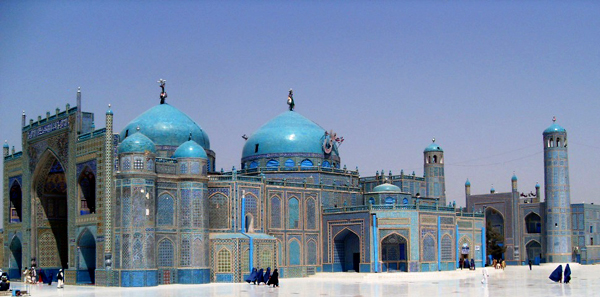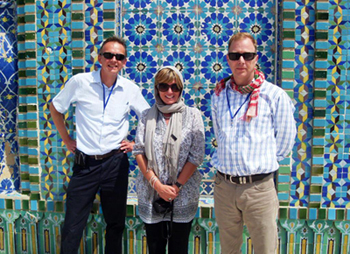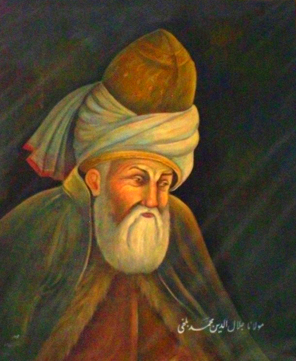We review our programmes annually to monitor progress. Security concerns in Afghanistan make these reviews more challenging than in other countries but, with careful planning much can be achieved and learned. I recently joined the team reviewing a new project which focuses on strengthening civil society, 'Tawanmandi', on a trip to the provincial capital of Balkh province, Mazar-e-Sharif.

The city's name means 'Tomb of the Exalted', because this is where reputedly Hazrat Ali, cousin and son-in-law of the Prophet Mohammed is buried. I had a few minutes to visit the Blue Mosque, the most famous mosque in Afghanistan which was absolutely exquisite - a massive building with every inch covered in blue delicately patterned tiles. The contrast between the dazzling white courtyard, the tiles, and the elegance of the buildings against the brilliant blue sky of an Afghan summer's day was stunning. The mosque was bustling with worshippers including many women hurrying along in their bright blue burquas. People stared to see us foreigners - these days Afghanistan gets few tourists, but they were very welcoming and returned my smiles, offering 'Salaams'.

We had flown to Mazar to meet with a number of civil society organisations working in the province. The Provincial Governor had kindly allowed us to have a small workshop in his compound. The meeting room was covered with portraits of men and women, including President Karzai and Ahmed Shah Massood, the Mujahdeen leader. The rest were paintings of Balkh poets from across history - including several female poets who wrote poems before the coming of Islam. I never knew that Rumi, the greatest of all Islamic mystic poets was a son of Balkh.

Representatives of 12 organisations were there, including some already receiving grants from Tawanmandi. I met many people including Seema, a passionate and articulate Afghan woman whose organisation, with funding from Tawanmandi, is providing psycho-social support to women who have been raped or are victims of domestic violence. She has to get 'buy in' from men in the community, and in particular, the village elders and religious leaders. Already over 400 community leaders have received training and sensitisation on women's rights. At the end of the training she asks participants for feedback on what they have learned and records their answers on video. She then shows these video clips to community leaders at future trainings, so they learn that their peers are changing their attitudes in different villages across the province. At the workshop the group agreed it was essential to get the support of village elders and mullahs in order for any project to work effectively, no matter what issue it was addressing.
The representatives felt that in the past civil society programmes were driven by the needs of the donors, rather than the needs of the people and the organisations. Donors understood the importance of promoting things like basic human rights, but they were not always ready to understand the culture and the complexity of raising issues, like women’s rights. They felt Tawanmandi was different and appreciated how the programme had consulted widely, gathering the views of different civil society activists. They were pleased this was the second time in less than a year people had come to Balkh to talk, understand the challenges they faced and listen to their ideas.
Tawanmandi, so far has given out 27 grants after receiving over 170 proposals for activities in the areas of access to justice, peace-building and conflict resolution. At least three of the organisations at the workshop had been unsuccessful in the first round. The participants welcomed the rigour and transparency that the Tawanmandi programme operated. The desire for quick results in the past encouraged organisations to take short cuts, such as paying people to attend meetings and working in places that were easy, rather than where there was a real need. One Tawanmandi grantee had been experiencing pressure from government officials to work in a particular area which they did not think had the greatest need - they did not want to do this. This was not an uncommon problem, but this was the first time a donor was actively supporting them to address this situation.
The participants supported Tawanmandi's rigorous approach to awarding grants ensuring transparency and accountability. They were really pleased to hear that Tawanmandi will provide a range of grants, from $5000 to $1.5 million USD and that the administrative requirements will align with the size of the grants, and that applications will be accepted in the local languages of Dari and Pashto, and not only English.
I was really heartened to hear how happy people were with Tawanmandi. I was not able to join the consultations with organisations across the country, but it was clear the programme had listened to people and taken action on their ideas. Right at the very start of the programme, we held a meeting with civil society organisations at Kabul University. At the time I said, "We want Tawanmandi to be a different programme. We want you to see this as your programme. The UK and our partners, Norway, Denmark and Sweden want to support you to shape your organisations so that you can deliver what Afghans need." From what I heard at Mazar this is what Tawanmandi is doing.
'Where there is ruin, there is hope for treasure' wrote Rumi. There is so much ruin in Afghanistan, but here at his birthplace, amongst these dedicated civil society activists, there is treasure and real hope for the future.

3 comments
Comment by eusebio manuel vestias pecurto posted on
A segurança do Afeganistão ainda esta muito longe o sir presidente do Afeganistão tem que encontrar meios politicos com as outras religiões e entrar nos centros das decisões de projectos de segurança só assim o pais entra no caminho do progresso justiça e desenvolvimento
Comment by Khalid posted on
Hi Phillippa,
DFID and you are doing a fantastic job keep it up. My name is Khalid Zamani and I am afghan/brit. At the moment I live in Kabul. I have a Masters degree in Agricultural Economics from the University of Reading. I was just wondering if DFID has any projects in agriculture development of Afghanistan.
Thanks
Comment by davood Mohammadi posted on
The DFID development projects in Afghanistan are basically imperative for the reconstruction of the country and social promotion. However based on the evidences and reports many of these costly projects have been implemented without enough prior research and study, thus the outcomes have been so little.
A tangible example of this mess has recently revealed by the Guardian report on The UK's construction projects in Helmand province.
Many critics believe that these projects are mainly planned and implemented without any consultation with the native expertise and ordinary people.
Davood Mohammadi
Master student of Globalization and Development
University of Warwick